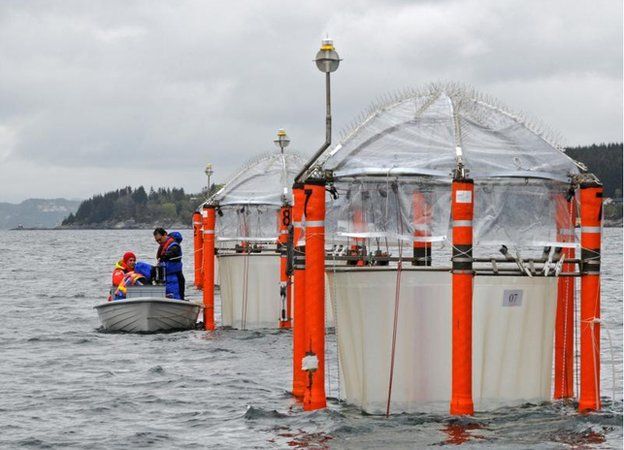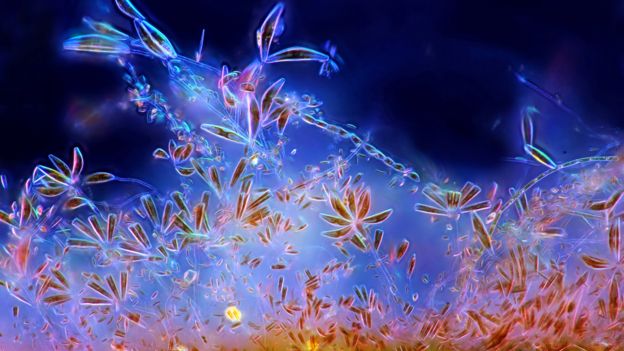All sea life will be affected because carbon dioxide emissions from modern society are making the oceans more acidic, a major new report will say.
The eight-year study from more than 250 scientists finds that infant sea creatures will be especially harmed.
This means the number of baby cod growing to adulthood could fall to a quarter or even a 12th of today's numbers, the researchers suggest.
The assessment comes from the BIOACID project, which is led from Germany.
A brochure summarising the main outcomes will be presented to climate negotiators at their annual meeting, which this year is taking place in Bonn in November.
The Biological Impacts of Ocean Acidification report authors say some creatures may benefit directly from the chemical changes - but even these could still be adversely affected indirectly by shifts in the whole food web.
What is more, the research shows that changes through acidification will be made worse by climate change, pollution, coastal development, over-fishing and agricultural fertilisers.
Ocean acidification is happening because as CO2 from fossil fuels dissolves in seawater, it produces carbonic acid and this lowers the pH of the water.

Mesocosms ("giant test tubes") allow scientists to study acidification effects on real-workd organisms
Since the beginning of the Industrial Revolution, the average pH of global ocean surface waters have fallen from pH 8.2 to 8.1. This represents an increase in acidity of about 26%.
The study's lead author is Prof Ulf Riebesell from the GEOMAR Helmholtz Centre for Ocean Research in Kiel.
He is a world authority on the topic and has typically communicated cautiously about the effects of acidification.
He told BBC News: "Acidification affects marine life across all groups, although to different degrees.
"Warm-water corals are generally more sensitive than cold-water corals. Clams and snails are more sensitive than crustaceans.
"And we found that early life stages are generally more affected than adult organisms.
"But even if an organism isn't directly harmed by acidification it may be affected indirectly through changes in its habitat or changes in the food web.
"At the end of the day, these changes will affect the many services the ocean provides to us."
On the agenda
Since 2009, scientists working under the BIOACID programme have studied how marine creatures are affected by acidification during different life stages; how these reactions reverberate through the marine food web; and whether the challenges can be mitigated by evolutionary adaptation.
Some research was done in the lab but other studies were conducted in the North Sea, the Baltic, the Arctic, and Papua New Guinea.
A synthesis of more than 350 publications on the effects of ocean acidification - which will be given to climate delegates at next month's summit - reveals that almost half of the marine animal species tested reacted negatively to already moderate increases in seawater CO2 concentrations.
Early life stages were affected in Atlantic cod, blue mussels, starfish, sea urchins and sea butterflies.
But an experiment with barnacles showed they were not sensitive to acidification. And some plants - like algae which use carbon for photosynthesis - may even benefit.

Organisms that use calcium carbonate to build their bodies will likely struggle
Dr Carol Turley, an ocean acidification expert from Plymouth Marine Labs in the UK described the BIOACID research as enormously important.
She told BBC News: "It's contributed enormous insights into the impacts that acidification can have on a wide range of marine organisms from microbes to fish.
"It's also explored how in combination with ocean warming and other stressors it might play out at the ecosystem level and affect human society.
"On the lead-up to the UN climate change negotiations in Bonn this November it is clear that the ocean and its ecosystems should not be ignored."
The conference is being held in Germany but it is being chaired by Fiji, which wants delegates to give due prominence to the effects of CO2 on the ocean.
Latest Stories
-
Who heads the National Insurance Commission (NIC)?
12 minutes -
Outlook of Sub-Saharan African countries to be neutral in 2025 – Fitch
23 minutes -
GH₵490m unaccounted for by ECG in three months – Audit report
24 minutes -
ICS students use theatre to amplify call against illegal mining in Ghana
28 minutes -
From despair to triumph: EDUCARE Trust Fund beneficiary becomes medical doctor
34 minutes -
Chief Moomen to unveil Mansa Musa Epic Theater
58 minutes -
Academic City is chartered: Redefining tertiary education in Africa takes full force
1 hour -
Financing challenges to remain in Ghana, Zambia – Fitch
1 hour -
GUSA president calls for government aid amid funding crisis
1 hour -
Cote d’Ivoire gets state of the art Technical Centre thanks to FIFA Forward
2 hours -
Kwasi Kwarteng: Exposing the inconsistencies in NDC’s promise on no academic fees for first-year students
2 hours -
NDC begins interview for MMDCE aspirants in Ashanti Region
2 hours -
Government to release feeding funds for 31 days to senior high schools – CHASS
2 hours -
Tap into reserves for debt repayment amid growing international pressure – Prof Peprah to gov’t
3 hours -
Police arrest 3 in connection with alleged cocoa bean smuggling
3 hours

